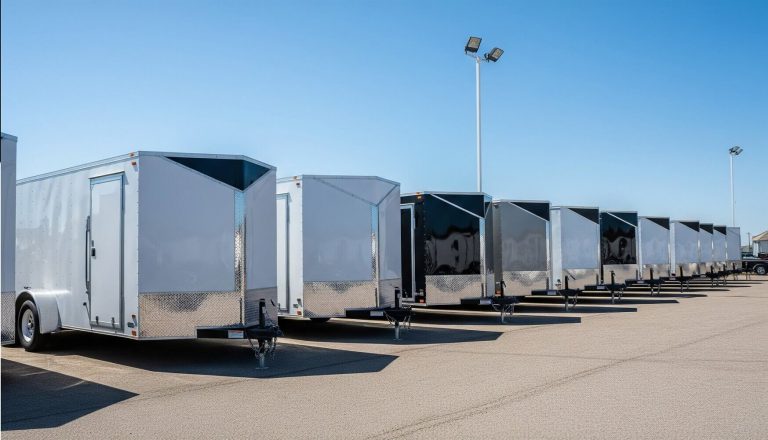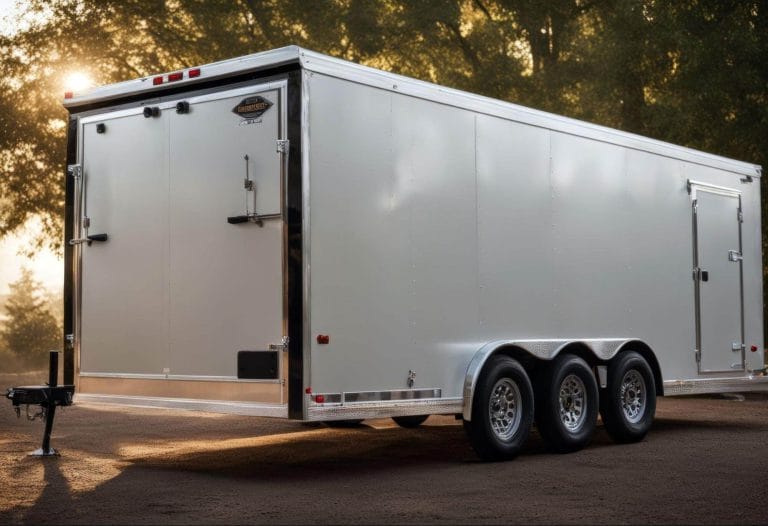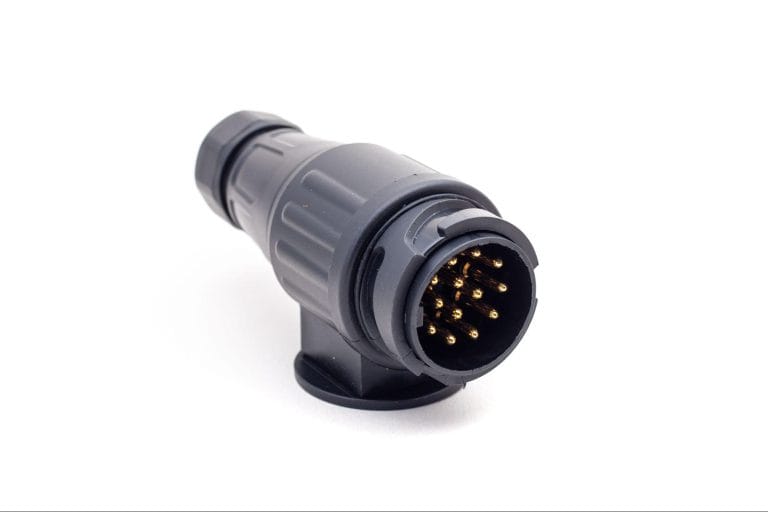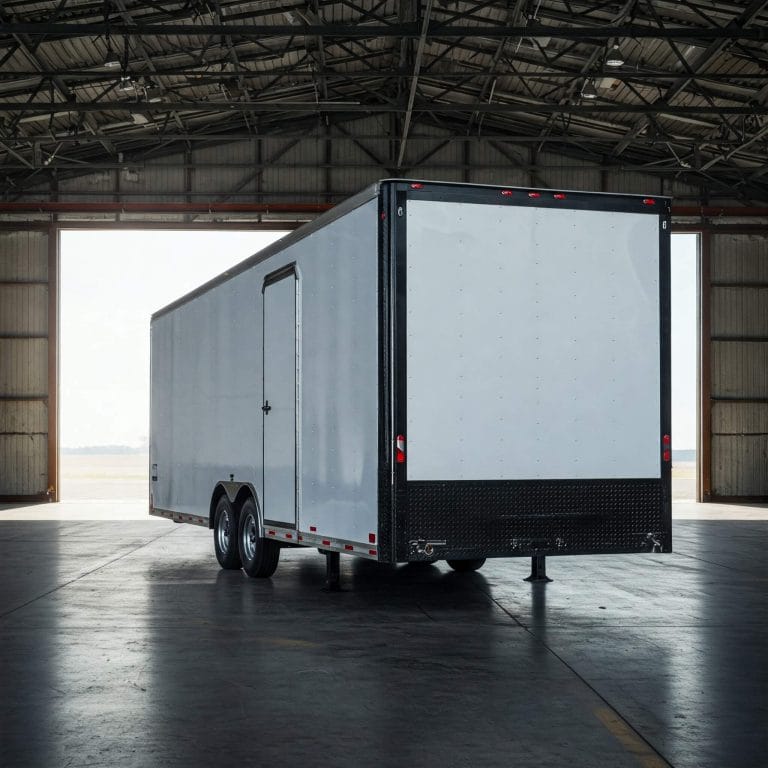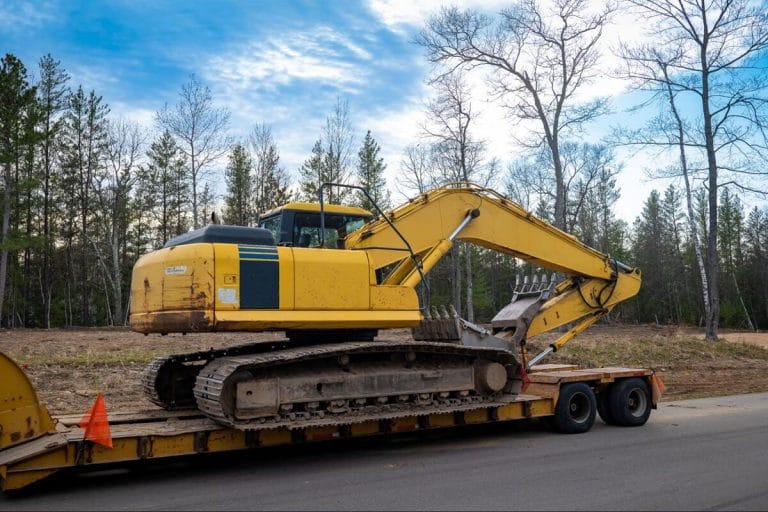When it comes to choosing the right trailer for your needs, many buyers face the debate between aluminum and steel trailers. Both materials have distinct advantages and disadvantages that can impact your decision.
Millennium Trailers knows how trailers are essential tools for transporting goods, vehicles, livestock, and more. The material of your trailer can significantly influence its performance, durability, and maintenance needs.
In this article, we’ll discuss the specifics of aluminum and steel trailers, highlight their pros and cons, and guide you through when to use each type. By the end, you should have a clearer understanding of which material is best for your needs.
Pros and Cons of Aluminum Trailer
Aluminum car trailers come with its advantages and disadvantages. Knowing them will ease your decision making and help you choose the right material for your trailer.
Pros:
- Lightweight: Aluminum trailers are significantly lighter than their steel counterparts. This reduced weight translates to better fuel efficiency and easier handling, especially for smaller vehicles.
- Corrosion Resistance: One of aluminum’s standout features is its resistance to rust and corrosion. This makes aluminum trailers ideal for use in wet and humid environments and able to hold many types of cargo, from race cars to equipment.
- Low Maintenance: Aluminum trailers require less frequent maintenance and painting due to their resistance to rust. This can save you time and money in the long run.
- High Resale Value: Aluminum trailers tend to hold their value better than steel trailers. Their resistance to rust and overall durability make them appealing to second-hand buyers.
Cons:
- Higher Initial Cost: Aluminum trailers typically cost more upfront compared to steel trailers. This higher initial investment can be a barrier for some buyers.
- Lower Strength: While modern aluminum alloys are strong, they are generally not as strong as steel. This can be a concern for heavy-duty applications or for carrying very heavy loads.
- Susceptibility to Stress and Fatigue: Aluminum can be more prone to stress fractures and fatigue over time, particularly if the trailer is frequently subjected to heavy loads and rough terrain.
Pros and Cons of Steel Trailer
Steel is another popular choice for trailers; however, steel trailers are usually used for slightly different purposes that aluminum ones.
Pros:
- High Strength: Steel is known for its superior strength and durability. It can handle heavy loads and rough terrain better than aluminum, making it ideal for heavy-duty applications.
- Lower Initial Cost: Steel trailers are generally more affordable upfront, making them an attractive option for buyers on a budget.
- Easier Repairs: Steel is easier to weld and repair than aluminum. This can be a significant advantage if your trailer is damaged and needs fixing.
Cons:
- Weight: Steel trailers are heavier, which can negatively impact fuel efficiency and handling. This added weight also means you may not be able to carry as much cargo compared to an aluminum trailer.
- Corrosion: Steel is prone to rust and corrosion, especially if not properly maintained. This can lead to higher maintenance costs for the trailer.
- More Maintenance: To prevent rust, steel trailers require regular painting and upkeep. This ongoing maintenance can be time-consuming and costly.
Steel vs Aluminum Trailer: When to Use
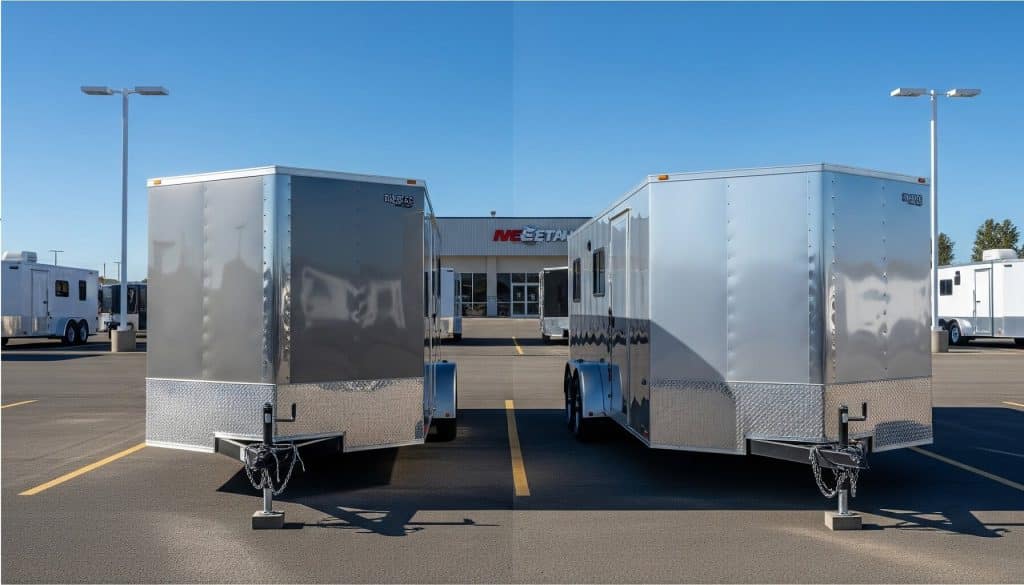
| Aluminum trailers | Steel trailers |
|
|
Steel vs Aluminum Trailer: Detailed Comparison
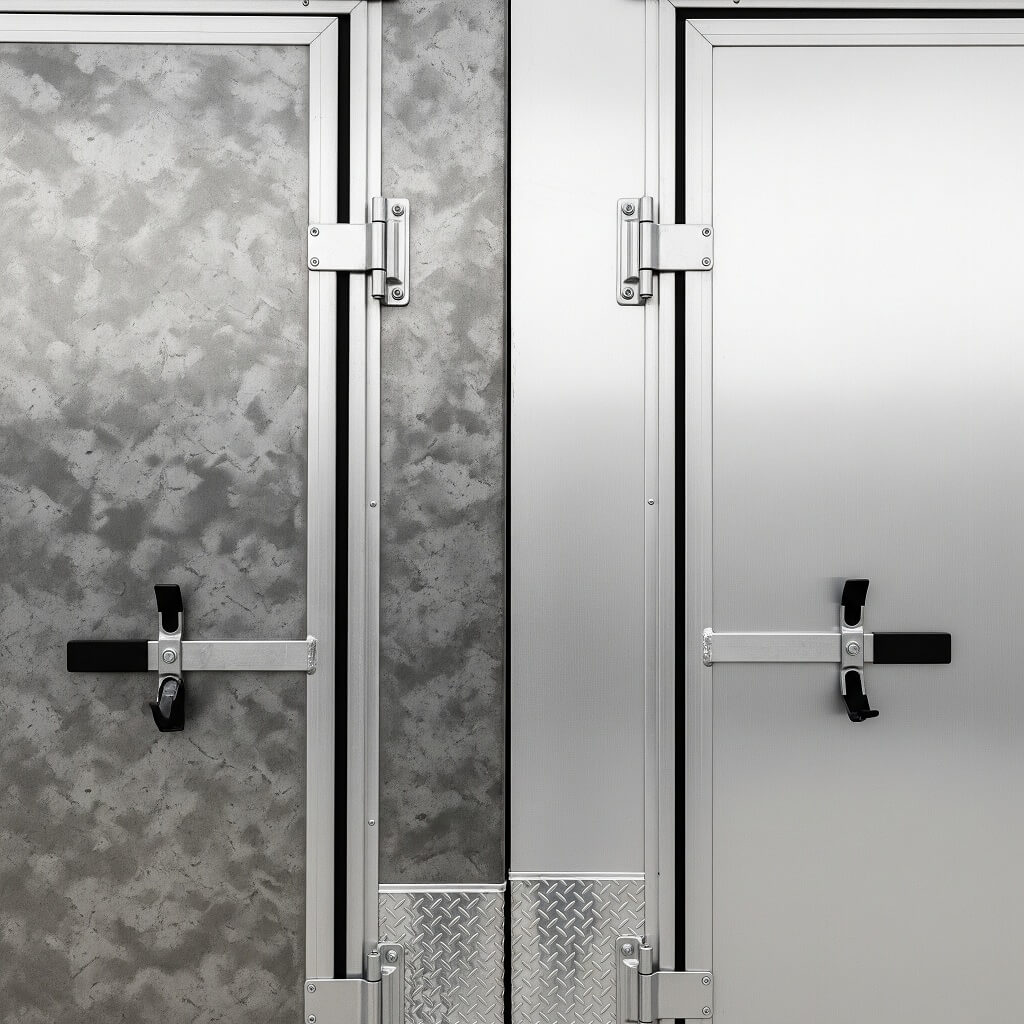
Let’s examine a more comprehensive comparison between the two and consider what vital information you should know before purchasing.
Weight and Fuel Efficiency
One of the primary advantages of aluminum trailers is their lightweight construction. Aluminum is significantly lighter than steel, which translates to better fuel efficiency for the towing vehicle, meaning you can potentially load more cargo. Aluminum trailers are often used in the car-hauling industry for enclosed transportation.
This can be particularly beneficial for those who frequently travel long distances. A lighter trailer also means easier handling and less strain on the towing vehicle, potentially extending its lifespan.
Steel trailers, on the other hand, are much heavier. While this can be an advantage in terms of durability and strength, it can negatively impact fuel efficiency. The additional weight requires more power from the towing vehicle, leading to higher fuel consumption and potentially higher operating costs.
Durability and Maintenance
Aluminum is highly resistant to rust and corrosion, making it an excellent choice for trailers that will be exposed to the elements. This resistance to corrosion means that aluminum trailers typically require less maintenance than steel trailers. You won’t need to worry about painting or coating them as frequently, saving both time and money.
Steel, while incredibly strong, is prone to rust and corrosion, especially if not properly maintained. Regular painting and coating are necessary to protect steel trailers from the elements.
Additionally, any scratches or dings in the paint need to be addressed promptly to prevent rust from developing. This higher maintenance requirement can be a downside for those looking for a low-maintenance option.
Strength and Load Capacity
Steel is known for its strength and load-bearing capacity. Steel trailers are ideal for heavy-duty applications, such as transporting large machinery, construction materials, or livestock. The strength of steel allows it to withstand significant stress and rough terrain without compromising its structural integrity.
While strong, aluminum does not have the same load-bearing capacity as steel. However, advancements in aluminum alloys have significantly improved the strength of aluminum trailers, making them capable of transporting ATVs or snowmobiles, for example.
They can now handle a wide range of loads, though they may not be suitable for the heaviest applications. For those who need to transport heavy loads regularly, steel may be the better choice.
Cost and Value
The initial cost of an aluminum trailer is typically higher than that of a steel trailer. This higher upfront cost can be a barrier for some buyers. However, aluminum trailers tend to hold their value better over time. Their resistance to rust and lower maintenance requirements make them an attractive option for second-hand buyers, often resulting in a higher resale value.
Steel trailers, while cheaper upfront, may not retain their value as well due to rust and corrosion issues. The ongoing maintenance and potential for rust can decrease their resale value. However, for those on a tight budget, the lower initial cost of a steel trailer can make it an appealing option.
Customization and Flexibility
Aluminum trailers offer a high degree of customization. You can select from a wide range of accessories and components to tailor the trailer to your specific needs. This includes options for increased storage space, high-ground clearance, various hitch types, living quarters, and tailgate features. Aluminum trailers’ flexibility makes them suitable for a wide range of applications.
Steel trailers are also customizable, but the heavier material can limit some design options. However, for heavy-duty applications, the strength of steel allows for customizations that can handle significant loads and stress.
Case Studies and Use Scenarios
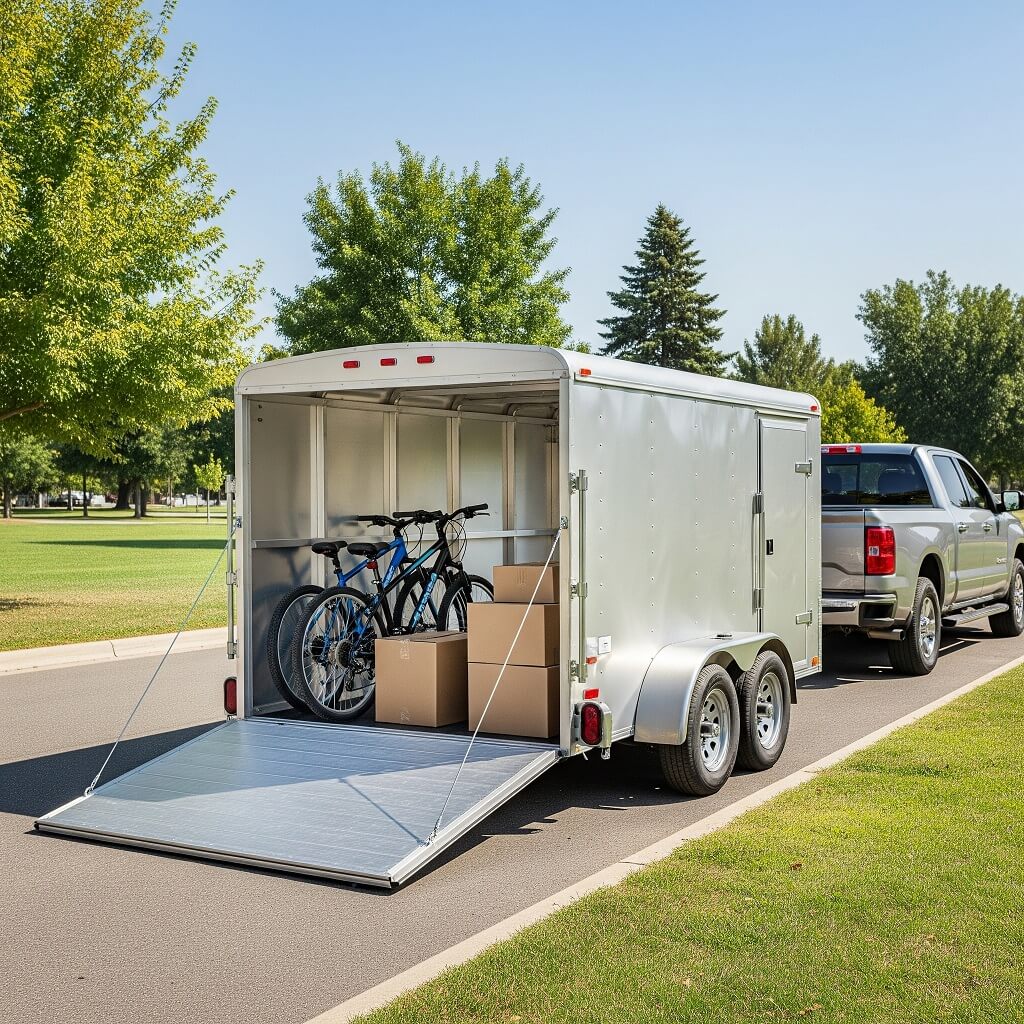
Aluminum Trailer
- Travel and Camping: Aluminum trailers offer the advantages of lighter weight and better fuel efficiency for those who frequently travel or go camping. They are also easier to tow and maneuver, making them ideal for long trips.
- Boat Transport: Aluminum trailers are resistant to rust and corrosion, making them perfect for transporting boats and other watercraft. The exposure to water and humidity won’t damage the trailer, ensuring longevity.
- Light to Medium Loads: Aluminum trailers provide a durable and efficient solution for transporting light to medium loads, such as motorcycles, ATVs, or household goods.
Steel Trailer
- Construction and Heavy Equipment: Steel trailers are the go-to choice for transporting heavy machinery and construction materials. Their superior strength can handle the weight and stress of heavy loads.
- Agriculture and Livestock: Steel trailers are ideal for agricultural use, including transporting livestock and heavy farm equipment. Their durability ensures they can withstand rough terrain and heavy use.
- Budget-Conscious Buyers: Steel trailers offer a cost-effective solution for budget-conscious buyers without compromising on load capacity and durability.
Environmental Considerations
When choosing between aluminum and steel trailers, it’s also important to consider the environmental impact. Aluminum is a more environmentally friendly option as it is highly recyclable. The recycling process for aluminum consumes less energy than that for steel, making it a more sustainable choice.
Steel, while also recyclable, requires more energy to produce and recycle. Mining and processing steel can have a significant environmental impact. However, the durability and long lifespan of steel trailers can offset some of these environmental concerns.
Contact Millennium Trailers Today!
Choosing between aluminum and steel trailers depends on your specific needs and priorities. Aluminum trailers offer lightweight, corrosion-resistant options that are perfect for frequent travelers and those in humid environments.
Steel trailers, on the other hand, provide the strength and durability needed for heavy-duty applications and rough terrain.
Both options serve different purposes, and at Millenium Trailers, we can help you customize a trailer that matches your needs and budget. Get in touch with us today or make an online require for your unique trailer.



